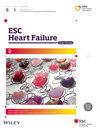Initial clinical experience with dapagliflozin in addition to optimized medical therapy in paediatric heart failure patients
Abstract
Aims
Dapagliflozin, a sodium-glucose cotransporter 2 (SGLT2) inhibitor, has shown clinical benefits in adults with heart failure (HF), improving cardiac function, reducing HF-related hospitalizations and enhancing survival rates. While extensively studied in adult HF, data on its efficacy and safety in paediatric HF patients remain limited. We aimed to evaluate the use of dapagliflozin in addition to optimized therapy in paediatric HF patients regarding safety, clinical outcomes and adverse events.
Methods and results
We conducted a single-centre retrospective analysis of 37 paediatric HF patients (median age 9.0 years, range 0.2–17.1 years) treated with dapagliflozin at our institution between April 2022 and February 2025. Clinical outcomes, left ventricular ejection fraction (LVEF), global longitudinal strain (GLS), NT-proBNP levels and estimated glomerular filtration rate (eGFR) were analysed at baseline, 3–6 months and the latest follow-up. The most frequent diagnoses among paediatric HF patients treated with dapagliflozin were dilated cardiomyopathy (43.2%, 56% of those with acute myocarditis), heart transplant recipients (18.9%) and single ventricle heart defects (16.2%). The median duration of dapagliflozin treatment was 189 days (Q1, Q3: 381, 596). Dapagliflozin was well tolerated, with no severe adverse effects observed. During follow-up, four patients required ventricular assist device (VAD) implantation, five underwent heart transplantation and one patient died. In six patients, the VAD could be explanted due to myocardial recovery. Overall, LVEF significantly improved from 40% at baseline to 51% at 3–6 months and further to 57% at latest follow-up (P = 0.016). GLS significantly improved from −9.2% to −14.7% from baseline to latest follow-up (P = 0.023). Heart failure classification significantly improved from baseline to latest follow-up (P = 0.004). NT-proBNP levels decreased during follow-up, without reaching statistical significance.
Conclusions
Dapagliflozin in addition to optimized HF therapy was safe and well tolerated in paediatric HF patients, with improvements in functional class, left ventricular contractility and heart failure symptoms. The study's limitations, including its small sample size and retrospective design, highlight the need for larger, multicentre, prospective trials to confirm these findings.


 求助内容:
求助内容: 应助结果提醒方式:
应助结果提醒方式:


